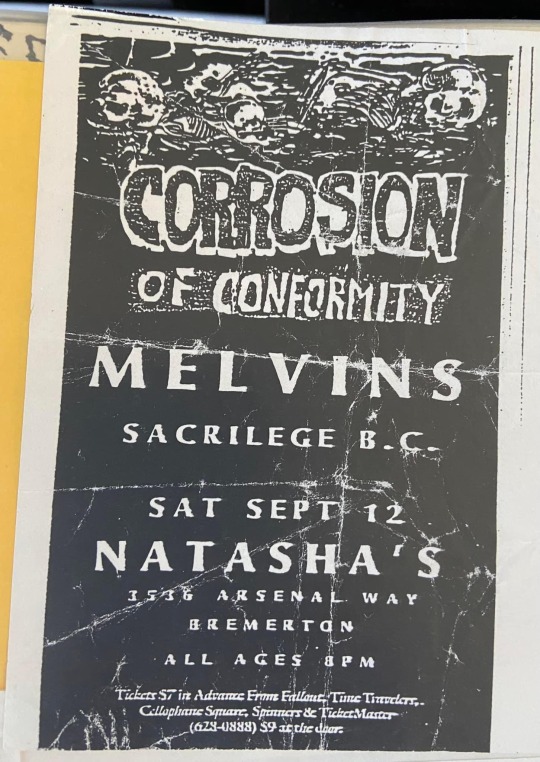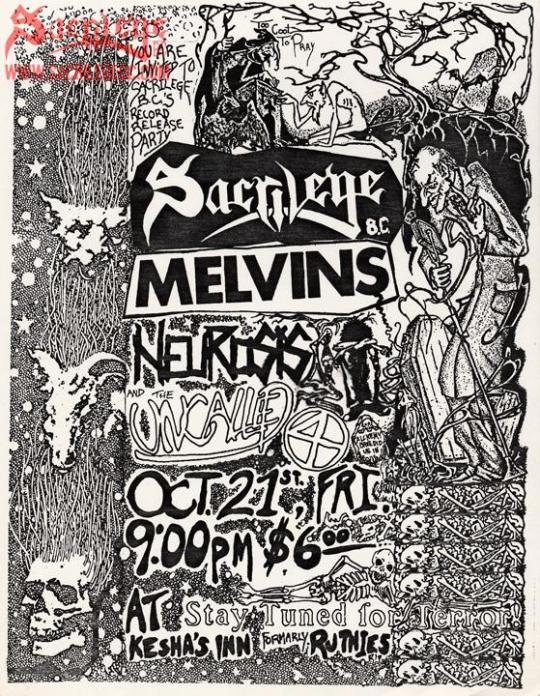#Sacrilege B.C.
Text
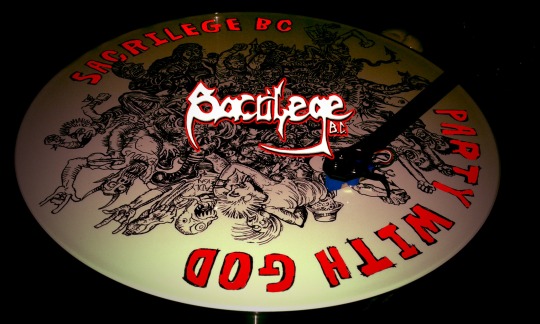
~Sacrilege B.C.-Party With God~
#crossover#hardcore punk#thrash metal#Sacrilege B.C.#san francisco#bay area#bay area thrash#80 metal#80s metal
2 notes
·
View notes
Text

Raquel Welch (1940 - 2023) by Terry O’Neill
#raquel welch#terry o'neill#terry o’neill#one million years b.c.#don chaffey#60s#60’s#60's#1960s#religious imagery#catholic imagery#christian imagery#christian#christianity#catholic#catholicism#one million years bc#sacrilege#sacrilegious#blasphemy
29 notes
·
View notes
Text
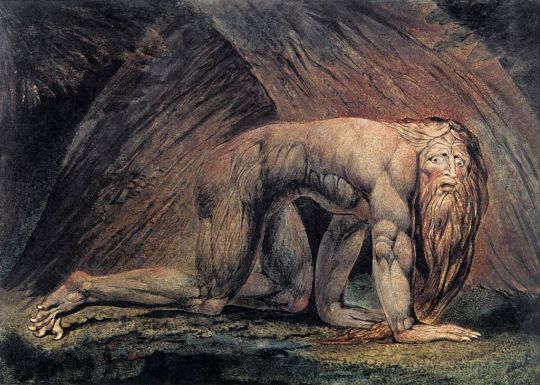

So, walking into the room filled with gas fumes that was the upset king of Babylon, Nebuchadnezzar, we’ve noticed Daniel could confront the fear and insanity of the moment because Daniel found a way to fit in, to be at home culturally in the place where God put him. But, paradoxically, in that place, Daniel learned to stand out. There is another pair of things I notice, and they also stand in some tension with each other.
Love Your Enemies?
The third thing I see about Daniel, and rather like the “fitting in” issue, is a bit of a surprise. Daniel Shows a Striking Tenderness toward Nebuchadnezzar. Recall just who this guy Nebuchadnezzar is: three, maybe four devastating attacks on Judah and Jerusalem one after the other, in (perhaps) 604, 601, 597, 586 and again in 585 B.C. Each time, he took captives. In 597 he had deported many back to Babylon, including the newly crowned young king, Jehoiachin. Then in the nightmare of 587-586, Nebuchadnezaar had slowly strangled Jerusalem with a bone-crushing siege in which starvation pushed some Jerusalemites to cannibalism. Nebuchadnezzar brutally killed King Zedekiah’s sons before his very eyes, then blinded Zedekiah and dragged him to Babylon, where his predecessor, Jehoiachin, enjoyed the acceptance of the Babylonian court as the true king of Judah. We have no account of Zedekiah’s death, but he doubtless lived his last years utterly shamed. Of course, in 586 Nebuchadnezzar razed the city of Jerusalem, demolished the temple of Solomon, looted the sacred precincts of their holy objects which were brought to Babylon and later subjected to further sacrilege. Nebuchadnezzar then abandoned the city, making no efforts even to insure that what few survivors remained could pay him tribute. So, to a frightened Nebuchadnezzar, Daniel could be tempted to say “Well, Nebuchadnezzar, your sins are catching up with you. God is going to burn it all down.” But Daniel shows genuine tenderness for the tyrant. In 4:19, Daniel wishes the dream and its meaning were for the king’s enemies, not him.
And the dream… The king saw a great tree, nourishing and shading all, brutally cut down by order of a “Holy Watcher” from heaven. The tree stump is rained on, but not uprooted: an iron band clamps the stump, presumably to slow its decomposition on invasion by parasites. Daniel informs Nebuchadnezzar that he, in fact, is the tree, and the tree’s felling portends a time of bestial insanity, in fact, “seven times” worth of insanity. We don’t know what that means, but the time was significant. Though this could have been a source of real pleasure to Daniel, he shows tender compassion. Daniel stresses the devastating reality of the coming insanity, but also assures the king of hope of restoration: that iron band around the stump pointed to divine mercy.Ancient monument depicting Nebuchadnezzar imagining the construction of his great temple in Babylon
Insane, dangerous times, even times of grief, anger and outrage, must still be times of tenderness, even for an enemy. Daniel had seen a goodly share of death and suffering, all caused by this king. Nevertheless, he wishes no harm on the king, so when this dangerous, powerful man enters a moment of vulnerability, Daniel’s voice sounds notes of reason and compassion.
Honesty About God’s Standards
But today we tend to think “reason and compassion” imply lowering God’s standard of righteousness, of being soft on sin. Not in Daniel’s case. The fourth thing I find here is that Daniel Honestly Witnesses to God’s Standards of Justice. In his tenderness, Daniel speaks soberly and with restraint of God’s moral order. This dream story is all about power and pride, the two trademark character features of Nebuchadnezzar, known for pride, savage use of power, injustice and oppression, and the violent destruction of others to expand his power and aggrandize the massive appetites of himself and his favored elites. Without preaching a long sermon, Daniel is honest about these things.
Nebuchadnezzar must clearly learn two huge truths: (a) there is one all powerful, sovereign God (b) Nebuchadnezzar is not He!
Nebuchadnezzar therefore will lose that one thing that was his glory: his charismatic, incisive mind. The mind that envisioned a global empire, a dazzling urban center, ornate temples, the hanging gardens of Babylon…wonders of the world then, legendary even today…this mind will now descend into bestiality. Nebuchadnezzar must be driven insane to see the insanity he had been living all along!
So Daniel pleads with the king (4:27) to break off from his sins, to practice righteousness, stop the violent oppression, and promises that God will indeed be gracious. But Nebuchadnezzar does not heed. Then, 12 Months pass. As often happens, the slow pace of divine justice is mistaken for its unreality. But suddenly, “it” happens. It’s actually a familiar biblical scene: someone patting themselves on the back, thinking they’ve got it made, and God calls their name. “This day your soul is required of you.” And then the night fell on the brilliant, arrogant mind of Nebuchadnezzar.
Agent of Redemption
Nebuchadnezzar was lucky. He got the message. He recovers, confesses the lordship of God, and admits that his own pride has been humbled by God. It’s revealing to compare the proclamation at the beginning of Daniel 4 with the one at the end. The first is the word of a fan but the second, the word of a follower. The speaker of the first is impressed, of the second, convinced.
All because of Daniel. Daniel found a way to fit in. He didn’t compromise or cave, but stood out. He truly loved his enemy, but he did not flinch from God’s just requirements. So Daniel became an agent of redemption.
May we all, in these troubled times, and in more troubled times to come, be God’s ambassadors of truth, tenderness, and redemption

1 note
·
View note
Text
Saints&Reading: Sat., May, 22, 2021
May 9(New cal.)/may22 ( old cal.)
The holy Prophet Isaiah (8th c. B.C.)
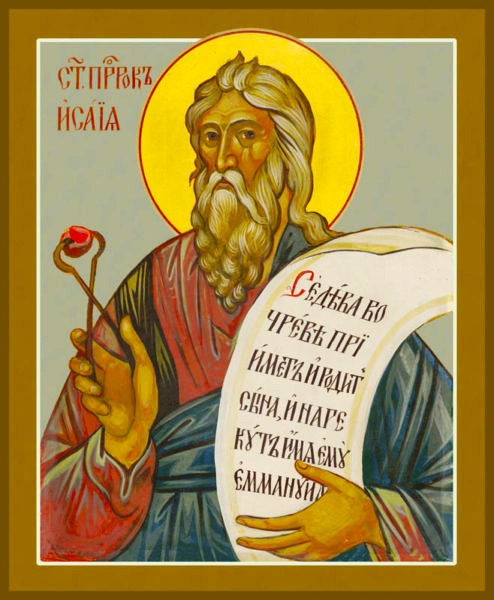
The holy Prophet Isaiah lived 700 years before the Birth of Christ, and was descended of royal lineage. The father of Isaiah, Amos, raised his son in the fear of God and in the law of the Lord. Having attained the age of maturity, the Prophet Isaiah entered into marriage with a pious maiden-prophetess (Is. 8: 3) and had a son Jashub (Is. 8: 18).
Saint Isaiah was called to prophetic service during the reign of Oziah (Uzziah), king of Judea, and he prophesied for 60 years during the reign of kings Joatham, Achaz (Ahaz), Hezekiah and Manasseh. The start of his service was marked by the following vision: he beheld the Lord God, sitting in a majestic heavenly temple upon an high throne. Six-winged Seraphim encircled Him. With two wings they covered their faces, and with two wings – they covered their feet, and with two wings they flew about crying out one to another "Holy, Holy, Holy Lord Sabaoth, heaven and earth art filled of His Glory!" The pillars of the heavenly temple did shake from their shouts, and in the temple swelled the smoke of incense. The prophet cried out in terror: "Oh, accursed a man am I, granted to behold the Lord Sabaoth, and having impure lips and living amidst an impure people!" Then was sent him one of the Seraphim, having in hand a red-hot coal, which he took with tongs from the altar of the Lord. He touched it to the mouth of the Prophet Isaiah and said: "Here, I have touched it to thine lips and the Lord doth do away with thine offences and doth cleanse thy sins". After this Isaiah heard the voice of the Lord, directed towards him: "Whom shalt I send and who wilt go to the Jews, who wilt go for Us?" Isaiah answered: "Here am I, send me, Lord, and I shalt go" (Is. 6: 1ff). And the Lord sent him to the Jews to exhort them to turn from the ways of impiety and idol-worship and to offer repentance. To those that repent and turn to the True God, the Lord promised mercy and forgiveness, but punishment and the judgement of God are appointed the unrepentant. Then Isaiah asked the Lord, how long would the falling-away of the Jewish nation from God continue. The Lord answered: "Until that time, as they neglect the city, nor be there people in the houses and this land be made desolate. Just as when a tree be felled and from the stump come forth new shoots, so also from the destruction of the nation wilt remain an holy remnant, from which emergeth a new tribe".
Isaiah left behind him a book of prophecy, in which he denounces the Jews for their unfaithfulness to the God of their fathers, and he predicts the captivity of the Jews and their return from captivity during the time of the emperor Cyrus, the destruction and renewal of Jerusalem and of the Temple. Together with this he predicts the historical fate also of the other nations bordering the Jews. But what is most important of all for us, the Prophet Isaiah with particular clearness and detail prophesies about the coming of the Messiah – Christ the Saviour. The prophet names the Messiah as God and Man, Teacher of all the nations, Founder of the Kingdom of Peace and Love. The prophet foretells the Birth of the Messiah from a Virgin, and with particular clearness he describes the Suffering of the Messiah for the sins of the world, he foresees His Resurrection and the universal spreading of His Church. By his clear foretelling about Christ the Saviour, the Prophet Isaiah merited being called an Old Testament Evangelist. To him belong the words: "This One beareth our sins and is smitten for us... He was wounded for our sins and tortured for our transgressions. The chastisement of our world was upon Him, and by His wounds we were healed..." (Is. 53: 4-5. Vide Book of Prophet Isaiah: 7: 14, 11: 1, 9: 6, 53: 4, 60: 13, etc.).
The holy Prophet Isaiah had also a gift of wonderworking. And thus so, when during the time of a siege of Jerusalem by enemies the besieged had become exhausted with thirst, he by his prayer drew out from beneathe Mount Sion a spring of water, which was called Siloam, i.e. "sent from God". It was to this spring afterwards that the Saviour sent the man blind from birth to wash, and for whom was restored sight by Him. By the prayer of the Prophet Isaiah, the Lord prolonged the life of Hezekiah for 15 years.
The Prophet Isaiah died a martyr's death. By order of the Jewish king Manasseh he was sawn through by a wood-saw. The prophet was buried not far from the Pool of Siloam. The relics of the holy Prophet Isaiah were afterwards transferred by the emperor Theodosius the Younger to Constantinople and installed in the church of Saint Lawrence at Blakhernai. At the present time part of the head of the Prophet Isaiah is preserved at Athos in the Khilendaria monastery.
About the times and the events which occurred during the life of the Prophet Isaiah, the 4th Book of Kings [alt. 2 Kings] speaks (Ch. 16, 17, 19, 20, 23, etc.), and likewise 2 Chronicles (Ch. 26-32).
© 1996-2001 by translator Fr. S. Janos.
Transfer of the Relics of Saint Nicholas, from Lycian- Myra to Bari in Italy
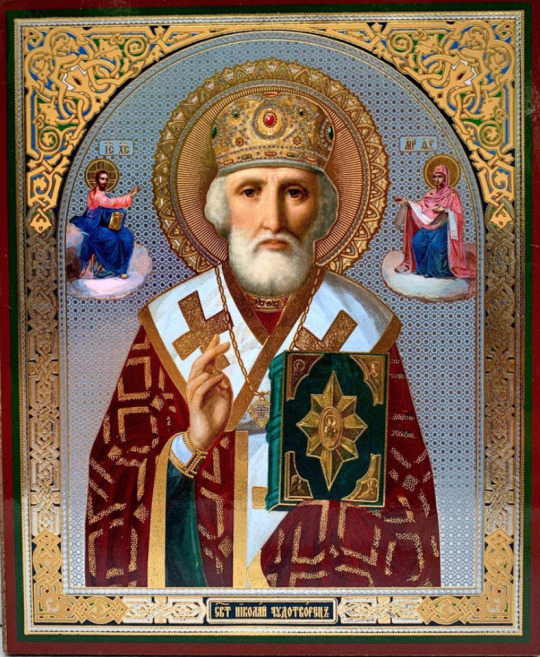
Saint Nicholas the Wonderworker, Archbishop of Myra in Lycia – the Transfer of the Relics from Lycian Myra to Bari in Italy: The Vita about his life is located under the 6 December feastday.
In the XI Century the Byzantine Greek empire was living through some terrible times. The Turks put an end to its influence in Asia Minor, they destroyed cities and villages, the murdered the inhabitants, and they accompanied their cruel outrage with the desecration of churches, holy relics, icons and books. The Mussulmen attempted also to destroy the relics of Saint Nicholas, deeply venerated by all the Christian world.
In the year 792 the caliph Aaron Al'-Rashid sent Khumeid at the head of a fleet to pillage the island of Rhodes. Having lain waste this island, Khumeid set off to Lycian Myra with the intent to rob from the tomb of Saint Nicholas. But instead of it he robbed another, standing alongside the crypt of the saint. Just as they succeeded in committing this sacrilege, a terrible storm lifted upon the sea and almost all the ships were shattered into pieces.
The desecration of holy things shocked not only Eastern, but also Western Christians. Christians in Italy were particularly apprehensive for the relics of Saint Nicholas, and among them were many Greeks. The inhabitants of the city of Bari, located on the shores of the Adriatic Sea, decided to save the relics of Saint Nicholas.
In the year 1087 merchants from Bari and Venice set out to Antioch for trade. Both these and others also had proposed on the return trip to take up the relics of Saint Nicholas and transport them to Italy. In this plan the men of Bari commissioned the Venetians to land them at Myra. At first two men were sent in, who in returning reported that in the city – all was quiet, and in the church where rested the glorified relics, they encountered only four monks. Immediately 47 men, having armed themselves, set out for the church of Saint Nicholas. The monk-guards, suspecting nothing, showed them the raised platform, beneathe which was concealed the tomb of the saint, where by custom, they anointed foreigners with myrh from the relics of the saint. The monks told them during this about an appearance of Saint Nicholas that evening to a certain elder. In this vision Saint Nicholas ordered the cautious preserving of his relics. This account encouraged the barons, – they saw an avowal for them in this vision and as it were a decree from the saint. In order to facilitate their activity, they revealed their intent to the monks and offered them money – 300 gold coins. The monk-guards refused the money and wanted to warn the inhabitants about the misfortune threatening them. But the newcomers bound them and put their own guards at the doorway. They took apart the church platform beneathe which stood the tomb with the relics. In this effort the youth Matthew was excessive in his especial zeal, wanting to as quickly as possible to find the relics of Saint Nicholas. In his impatience he broke the cover and the barons saw, that the sarcophagus was filled with fragrant holy myrh. The compatriots of the barons, the presbyters Luppus and Drogus, made a litany, after which the break of Matthew began to flow with myrh from the overflowing sarcophagus of the relics of the saint. This occurred on 20 April 1087.
Seeing the absence of a container chest, presbyter Drogus wrapped the relics in the cover cloth, and in the company of the barons he carried them to the ship. The monks – having been set free, alerted the city with the sad news about the abduction of the relics of the Wonderworker Nicholas by foreigners. A crowd of people gathered at the shore, but it was too late...
On 8 May the ships arrived in Bari, and soon the joyous news made the rounds of all the city. On the following day, 9 May 1087, they solemnly transported the relics of Saint Nicholas into the church of Saint Stephen, situated not far from the sea. The solemn bearing of the relics was accompanied by numerous healings of the sick, which inspired still greater reverence for the Saint of God. A year afterwards a church was built in the name of Saint Nicholas and consecrated by Pope Urban II.
This event, connected with the transfer of the relics of Saint Nicholas, evoked a particular veneration for the Wonderworker Nicholas and was marked by the establishing of a special feastday on 9 May. At first the Feastday of the Transfer of the Relics of Saint Nicholas was observed only by the people of the city of Bari. In the other lands of the Christian East and West it was not adopted, despite the fact that the transfer of the relics was widely known about. This circumstance is to be explained by the custom in the Middle Ages of venerating primarily the relics of local saints. Moreover, the Greek Church did not establish the celebration of this remembrance, since for it the loss of the relics of Saint Nicholas was a sad event.
The Russian Orthodox Church celebration of the memory of the Transfer of the Relics of Saint Nicholas from Lycian Myra to Bari in Italy on 9 May was established soon after the year 1087, on the basis of an already established veneration by the Russian people of the great Saint of God, brought over from Greece simultaneously with the acceptance of Christianity. The glorious accounts about the miracle-workings, done by the saint on both land and sea, were widely known to the Russian people. Their inexhaustible strength and abundance testify to the especially graced help of the great Saint of God for suffering mankind. The image of Saint Nicholas, a mighty Wonderworker and Benefactor, became especially dear to the heart of the Russian people, since it inspired deep faith and hope for his intercession. The faith of the Russian people in the abundant aid of the Saint of God was marked by numerous miracles.
A significant body of literature was compiled about him very early in Russian writings. Accounts about the miracles of Saint Nicholas done in the Russian land were recorded early on in deep antiquity. Soon after the Transfer of the Relics of Saint Nicholas from Lycian Myra to Bari, there appeared a Russian redaction of his Vita and an account about the Transfer of his holy relics, written by one contemporary to this event. Earlier still was written a laudation to the Wonderworker. And each week on Thursday, the Russian Orthodox Church honours his memory in particular.
In honour of Sainted Nicholas were erected numerous churches and monasteries, and with his name Russian people are wont to name their children at Baptism. In Russia are preserved numerous wonderworking icons of the saint. Most reknown among them are the images of Mozhaisk, Zaraisk, Volokolamsk, Ugreshsk and Ratny. There was neither house nor temple in the Russian land, in which there was not an image of Saint Nicholas the Wonderworker. The significance of the graced intercession of the great Saint of God is expressed by the ancient compiler of the Life-Vita, in the words of whom Sainted Nicholas "did work many glorious miracles both on land and on sea, aiding those downtrodden in misfortune and rescuing the drowning, carried to dry land from the depths of the sea, raising up others from corruption and bringing them home, liberating from chains and imprisonment, averting felling by the sword and freeing from death, and granting much healing to many: sight to the blind, walking to the lame, hearing to the deaf, and speech to the mute. He brought riches to many suffering in abject poverty and want, he provided the hungry food and for each in their need he appeared a ready helper, an avid defender and speedy intercessor and protector, and such as appeal to him he doth help and deliver from adversity. Both the East and the West know of this great Wonderworker, and all the ends of the earth know his miracle-working".
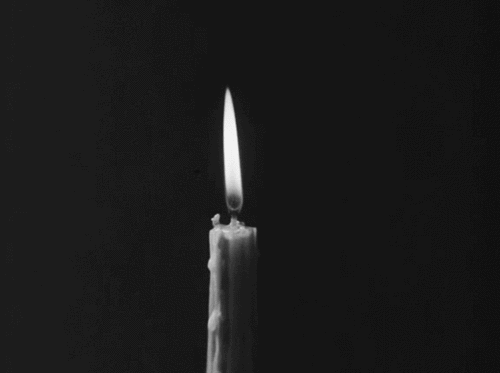
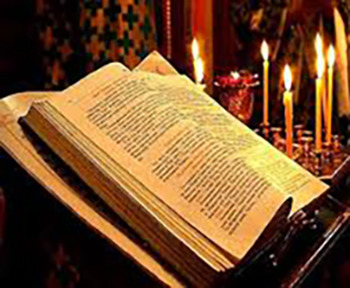
Luke 6:17-23
17And He came down with them and stood on a level place with a crowd of His disciples and a great multitude of people from all Judea and Jerusalem, and from the seacoast of Tyre and Sidon, who came to hear Him and be healed of their diseases,18 as well as those who were tormented with unclean spirits. And they were healed.19 And the whole multitude sought to touch Him, for power went out from Him and healed them all.20 Then He lifted up His eyes toward His disciples, and said: Blessed are you poor, For yours is the kingdom of God. 21 Blessed are you who hunger now, For you shall be filled. Blessed are you who weep now, For you shall laugh. 22 Blessed are you when men hate you, And when they exclude you, And revile you, and cast out your name as evil, For the Son of Man's sake. 23 Rejoice in that day and leap for joy! For indeed your reward is great in heaven, For in like manner their fathers did to the prophets.
Hebrews 13:17-21
17 Obey those who rule over you, and be submissive, for they watch out for your souls, as those who must give account. Let them do so with joy and not with grief, for that would be unprofitable for you. 18 Pray for us; for we are confident that we have a good conscience, in all things desiring to live honorably. 19 But I especially urge you to do this, that I may be restored to you the sooner. 20 Now may the God of peace who brought up our Lord Jesus from the dead, that great Shepherd of the sheep, through the blood of the everlasting covenant, 21 make you complete in every good work to do His will, working in you what is well pleasing in His sight, through Jesus Christ, to whom be glory forever and ever. Amen.
2 notes
·
View notes
Text
the myth of medusa

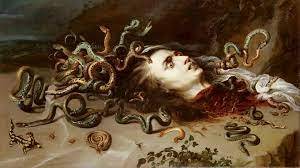
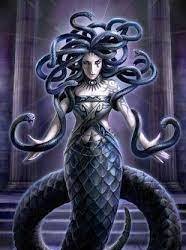
The snake-haired Medusa does not become widespread until the first century B.C. The Roman author Ovid describes the mortal Medusa as a beautiful maiden seduced by Poseidon in a temple of Athena. Such a sacrilege attracted the goddess' wrath, and she punished Medusa by turning her hair to snakes.Medusa—who in later art is depicted as beautiful although deadly—was the only one of the three who was mortal; hence, Perseus was able to kill her by cutting off her head. From the blood that ran from her neck sprang Chrysaor and Pegasus, her two offspring by Poseidon.Medusa represents philosophy, beauty and art. The Medusa head is part of fashion designer Gianni Versace's symbol. ... Perseus the hero slayed Medusa, the only mortal of the Gorgon sisters, by viewing her in the reflection of the mirrored shield of Athena. Perseus then beheaded her.
0 notes
Photo
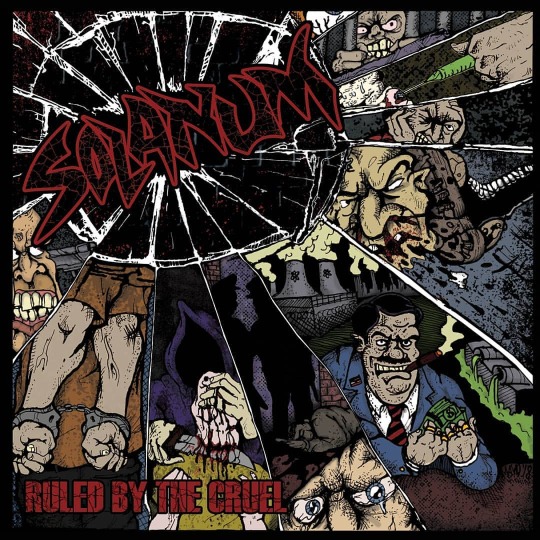
Up now for pre-order, coming May 14th! SOLANUM "Ruled By The Cruel" CD :: http://bit.ly/solanumcd Digital :: https://ffm.to/solanum T-Shirt :: http://bit.ly/solanumshirt T-Shirt + CD Bundle :: http://bit.ly/solanumbundle Solanum return to Horror Pain Gore Death Productions with new album "Ruled By The Cruel"! Hailing from the frozen prairie wasteland that is Winnipeg, Manitoba, Solanum execute crippling Canadian crossover Thrash that is full of intrinsic power and relentless attitude. "Ruled By The Cruel" is the second full length album from Solanum and showcases nine tracks of vicious, thrashing madness that features lyrical themes focused on the never ending, worldwide suffering and savagery... prepare for total annihilation! For fans of Aftermath, Broken Bones, D.R.I., Excel, Lethal Aggression, Ludichrist, Nuclear Assault, Razor, Sacred Reich, Sacrilege B.C., Vio-lence and Wehrmacht #solanum #ruledbythecruel #crossover #thrash #thrashmetal #aftermath #brokenbones #dri #dirtyrottenimbeciles #excel #lethalaggression #ludichrist #nuclearassault #razor #sacredreich #sacrilegebc #violence #wehrmacht #hpgd #horrorpaingoredeath (at Horror Pain Gore Death Productions HQ) https://www.instagram.com/p/CNnK-hIpln5/?igshid=1r1kfg5ujc2ow
#solanum#ruledbythecruel#crossover#thrash#thrashmetal#aftermath#brokenbones#dri#dirtyrottenimbeciles#excel#lethalaggression#ludichrist#nuclearassault#razor#sacredreich#sacrilegebc#violence#wehrmacht#hpgd#horrorpaingoredeath
0 notes
Text
Herod the not so great
The prophet Micah spoke from ages past (700 years prior to fulfillment) In Micah 5:2 ESV "But you, O Bethlehem Ephrathah, who are too little to be among the clans of Judah, from you shall come forth for me one who is to be ruler in Israel, whose coming forth is from of old, from ancient days."
Most people do not realize that there was actually two Bethlehems; one Bethlehem Ephrathah in Judea and another Bethlehem of Zebulun in northern Palestine. The Bethlehem of Zebulun is mentioned in the book of Joshua (19:15). When you consider that the Old Testament Cannon was complete around 100 BC and that its' prophecies are very specific and measurable, it is easy to see the hand of God move through His scriptures and His people Israel. Micah spoke of a specific place and that a ruler from ancient days would come forth. If that is not a picture of Christ then I will eat my hat!
The bread of life emerges from the house of bread, the birth place of David, and Satan begins to try to thwart God's plan of redemption for His people. Herod is lucifer's henchman!
Who was this Herod the great? Why would we give this man the emblem of greatness? Why would God put that man in his position and allow this despot to try to thwart His plan. By any surface or worldly measure, Herod the founder of the Herodian dynasty kingdom of Judah (37-4 B.C.), was great. An Idumean (an Edomite or of the line of Esau, a historic enemy of the Jews), appointed ruler by the Roman senate in 40 BC.
He was described as having a commanding presence; he excelled in physical exercise, he was a skillful diplomat, but above all else he was prepared to commit crime in order to gratify his unbound ambition. He commissioned many great buildings, with the temple as his crowning jewel. However Herod saw fit to place at the main entrance, a huge roman eagle which pious Jews saw as sacrilege. A group of Torah students promptly smashed this emblem of idolatry and oppression. Herod had them hunted down, dragged in chains to his residence in Jericho, where they were burned alive. Herod took pains to make sure the temple would be run without future problems of this kind. He appointed his own High Priest, having by then put to death forty-six leading members of the Sanhedrin, the rabbinical court.
Herod tortured without remorse, family members, priests and anyone that threatened his reign of terror. No wonder the Bible records that when the Herod was troubled, all Jerusalem was as well. Herod had in succession
10 wives, therefore it is easy to infer this megalomaniac's unbound lust for everything the world could offer. It is the lot of man to view the surface and judge the appearance of success and wealth while ignoring the inner rot.
Why would God put that man in his position and allow this despot to try to thwart His plan? This, in fact is the harder question to answer. The explanation may be tied in with the biblical account of the wisemen. While Herod the king was troubled with the news of the star while the kings of the east were fascinated, rejoicing and worshipful. Herod's reaction was one of subterfuge, with the result the annihilation of the innocent. The kings of the east bended their knee to the two-year-old child sacrificing their time and treasure to secure safe passage for Joseph's family. They were blessed with communication with God through a dream and bore witness to the Son of God. Herod on the other hand, as written by the Jewish historian Flavius Josephus died a painful and debilitating disease that caused breathing problems, convulsions and rotting of his body from worms. Indeed he was rotten on the inside!
May this be a lesson for every one of us! Judge not the surface of wealth and success. Honour those who are of a godly character. Save the emblem of greatness to those who deserve it not to those who are the most popular or appear on the TV screen.
Above all else praise the one, the maker of the universe, to Him alone be the glory, to Him alone my soul shall bend, Immanuel, Ayesha.
I hope you're enjoying my blog as much as I am enjoying writing it as I slowly work through the Book of Matthew. Don't hesitate to leave a comment.
Yours Truly DW Stan
0 notes
Photo

The Moon of Pejeng, also known as the Pejeng Moon, in Bali is the largest single-cast bronze kettle drum in the world. and "the largest known relic from Southeast Asia's Bronze Age period." It is "considered highly sacred by local people." It is thought to be a relic of early rice cultivation rituals.
The drum is 186.6 centimetres (73.5 in) high and the diameter of the tympano is 160 centimetres (63 in). It is kept at Pura Penataran Sasih Temple in Pejeng, near Ubud, in the Petauan River valley which, along with the adjacent Pakerisan River valley, forms the heartland of South Bali where complex irrigated rice culture first evolved on the island.
The Dong Son people made the drum around 300 B.C., more than two thousand years ago. According to Balinese legend, the Pejeng Moon was a wheel of the chariot that pulled the real moon through the night sky. One night, as the chariot was passing over Pejeng, the wheel detached and fell to earth, landing in a tree, where it glowed nearly as brightly as the real moon. This light disturbed a thief who, annoyed, climbed the tree and urinated on it; the thief paid for his sacrilege with his life. The moon eventually cooled and has been preserved as a sacred relic by the local villagers.
It is the largest and most complete type of drum known as the Pejeng type drums which have been found in Bali and Java, Indonesia.
The Pejeng Moon was first reported to the western world by G.E. Rumphius in his book The Ambonese Curiosity Cabinet, published in 1705. The Moon was first systematically described by the Dutch artist W.O.J. Nieuwenkamp who reproduced the famous face motif.
Georg Eberhard Rumphius (originally: Rumpf; baptized c. November 1, 1627 – June 15, 1702) was a German-born botanist employed by the Dutch East India Company in what is now eastern Indonesia, and is best known for his work Herbarium Amboinense produced in the face of severe personal tragedies, including the death of his wife and a daughter in an earthquake, going blind from glaucoma, loss of his library and manuscripts in major fire, and losing early copies of his book when the ship carrying it was sunk. In addition to his major contributions to plant systematics, he is also remembered for his skills as an ethnographer and his frequent defense of Ambonese peoples against colonialism.
16 notes
·
View notes
Text
Finding Friends in Unexpected Places
For years now, Shelter Rockers have heard me add the name of my friend, Ed Searcy, to the mi she-beirach list whenever we pause over an open Torah scroll to pray for our relatives and friends who have been stricken with illness. Occasionally, people ask who he is—some interested because I have been adding his name to the list for so long and others, I suppose, because it seems curious that a rabbi would ask his congregation to pray so assiduously for the recovery of a Christian clergyman without feeling the need to explain their relationship or to chart its history.
I admit it’s been a long time. Ed was diagnosed with the double whammy of multiple myeloma (a chronic cancer of the plasma cells) and amyloidosis (a rare but serious condition caused by the accumulation of proteins in the form of insoluble fibers within the tissues of one’s body) six years ago in 2011. When he told me about the diagnosis, I asked what I could do for him. His answer was that I could pray for his recovery. So that’s what I’ve been doing. Why wouldn’t I have wanted to do whatever I could to ease his burden? He’s been my friend, after all, for more than thirty years. But I’ve never written about the specific way we met, which I think I would like to write about this week.
But before I get to the past, I want to write about the present. It has been, to say the least, a worrisome week. The twenty bomb threats phoned into Jewish institutions on Monday brought the grand total of such threats to almost ninety, including some made to targets relatively close at hand to us at Shelter Rock. Nor has it been a week merely of bad words: there have also been some very bad deeds to go along with them in the desecration of the Mount Carmel Cemetery in Philadelphia and the Chesed shel Emeth Cemetery in Union City, Missouri. In a different world, we would hardly take note of such pointless hooliganism. But the combination of threat, provocation, vandalism, and a general uptick in anti-Semitic incidents in general lends these acts of sacrilege an ominous aura they might otherwise not have.
But more unexpected—to me, at least—was the response to the vandalism. In Missouri, Vice President Pence went out of his way to visit the cemetery last Wednesday and actually took part in the clean-up. The governor of Missouri, Eric Greitens, did the same. And, while still at work at the cemetery, Governor Greitens took the opportunity to reveal that President Trump had phoned to ask him to convey the president’s good wishes to the clean-up crew for their work on behalf of the Jewish community and, more importantly, for their effort to show the world “that what happened [in Union City] the other night is not who America is.” Whatever any of us thinks about the current administration, yea or nay, the sight of the governor of Missouri and the vice-president of the United States rolling up their sleeves to restore a desecrated cemetery is a moving example of our national spirit and should be acknowledged as such.
But even more surprising was the LaunchGood.com campaign undertaken by two Muslim Americans, Linda Sarsour and Tarek el-Messidi, to raise funds, at first, to help restore the tombstones of Union City, which effort yielded $115,000 in just two or three days. And then campaign was expanded to include the effort to raise money to restore the damaged and/or toppled gravestones in Philadelphia. What the “real” motives of these people in doing this were, who knows? The cynic in me wants to imagine that this is just a good moment for American Muslims to raise their public profile in a very positive way. But the bottom line is that more than two-thirds of the donations have come from Muslim Americans, and it’s hard to see a conspiracy here even despite the million reasons to distrust unexpected largesse from unfamiliar quarters…and particularly quarters from which some of Israel’s harshest critics have come in recent years. I see that. And I certainly do not wish to assist people who otherwise work to hurt Israel and damage Israel’s reputation in their disingenuous effort to distance themselves from the charge of anti-Semitism merely by undertaking a LaunchGood campaign. I’m by nature neither a naïve person nor an overly trusting one.
Yet…even though I share the skepticism of many who have publicly questioned the motives of the givers, I’d like to think that we are witnessing an act of charitable kindness rather than a mere P.R. opportunity. A terrible thing happened. People responded…including people of whom we are reasonably wary. Still, I propose that we take the donations from Muslim America, and from so many other quarters as well, as well as the public gesture by the Vice-President and the Governor of Missouri (admittedly a Jewish person…but even so) and Pennsylvania governor Tom Wolf and Philadelphia mayor Jim Kenney, at face value, and allow them to suggest that the haven we have found in this place is real, that the patriotism we feel in our hearts for our country reflects far more than wishful thinking, and that the values that we presume to underlie the republic are intact and well. For another example of recent Muslim solicitude for our Jewish problems, this one Florida-based, click here.
And that brings me to the Reverend Searcy. My first pulpit was in Richmond, a town just outside Vancouver, British Columbia, Canada. This was a long time ago. It was a season of brand new things for me: my first pulpit (although this was eight years after I was ordained, having taken a slight detour through the halls of academe on my way to the bimah), a new country, a new time zone, a new life style (it was the first time in my life I ever lived in a private home rather than an apartment), a new baby on the way…and a dozen other new thresholds to step over and new straits to negotiate.
Even though we had just finished a two-year stint in Germany, I don’t believe I had ever actually experienced real anti-Semitism until I came to Richmond. It looked calm. The people outside the congregation that I met here and there seemed pleasant and welcoming. The mayor of Richmond, Gil Blair, personally came to my installation to welcome me to his city. It all felt peaceful and good. And then, one Sunday morning only a few months after I was in place, the president of the congregation called me at 6 AM and asked me to meet him at the synagogue. I pulled on some clothes and drove over, and there I found what I had not even been savvy enough about the world previously to dread: the entire building painted with bright red swastikas and slogans so vile that even now, even after all these years, I still can’t quite bring myself to type them out for you to read. Trust me, it was awful. I was flummoxed completely. Clearly, we had to do something. But it wasn’t obvious what. Someone had already phoned the R.C.M.P. and they arrived promptly, but didn’t seem to take the painted slogans seriously as death threats (which is what they were, and unambiguously so), preferring instead to wave them away as vulgar graffiti. Eventually, they agreed to open a serious investigation. But that was still to come as I stood there in the cool morning air with the members of the Board of Trustees and pondered the best course forward.
What happened next was remarkable. The adjacent property was owned by a Catholic church, St. Joseph the Worker, and the oldest priest, whom I hadn’t even met yet, was named Father Pascale. I met him that morning when he arrived around an hour later not just to express his regrets formally and in person, but with an army of parishioners bearing pails and brushes, soap and solvent. They set themselves to cleaning the walls of our synagogue! And they did a fairly good job, although we eventually painted over the whole façade to make the vileness disappear entirely. But that was only the beginning.
We received letters from all across Canada, most of which came with checks to assist us in the clean-up. We heard from all the right people, including from the Premier of the province and the Member of Parliament who represented our riding. Mayor Blair came by several times to offer some support and encouragement. And in the context of all that good will, Ed Searcy came into my life.
In those days, he was the pastor of the South Arm United Church. He sent me a note in which he introduced himself and asked how he could help. I phoned and suggested we meet for a coffee and talk this through: I was shaken by the whole incident and wondered if he, being a real Canadian, might possibly have some insight into the larger picture I was facing that I as a newcomer lacked. And that was how I met Ed. He was kind, welcoming, reassuring. He reminded me—I’m sure he himself doesn’t remember exactly what he said, but I certainly do—he reminded me that the presence of evil doesn’t imply the absence of good…and he reminded me that the only practical way to combat the kind of viciousness and blind hated we had just encountered was to affirm our faith in the goodness of God. It was a simple sermon delivered over coffee at the edge of North America by young minister to a young rabbi. More than his insight, however, Ed extended his hand to me in friendship. And that is how I got to know Ed Searcy and why I invite the congregation weekly to join me in praying for his good health.
When I read about the desecration of that Jewish cemetery in St. Louis and the way people who aren’t “supposed” to care suddenly showed up to restore and repair the toppled stones, and how other Americans, including people who aren’t “supposed” to care about the stones in a Jewish cemetery, anted up not hundreds or thousands, but scores of thousands of dollars to assist in the restoration—I was brought back to my first experience of anti-Semitic violence on otherwise calm and quiet Geal Road in Richmond, B.C., an otherwise tranquil town filled with friendly, welcoming people.
So it turns out there are good people in the world! But that thought in turn inspires an unsettling, more-than-slightly-anxiety-producing question for us all to ponder: when tragedy, and particularly prejudice-tinged tragedy strikes other groups…does our example inspire the confidence and courage in those aggrieved souls that the efforts of so many from outside the Jewish community did in Missouri last week and in Richmond so many years ago? That, if you ask me, is the real question to take away from this whole story…and, if we dare, to answer honestly.
1 note
·
View note
Text
Daily Office Readings November 14, 2019 at 11:00PM
Psalm 88
Psalm 88
Prayer for Help in Despondency
A Song. A Psalm of the Korahites. To the leader: according to Mahalath Leannoth. A Maskil of Heman the Ezrahite.
1 O Lord, God of my salvation,
when, at night, I cry out in your presence,
2 let my prayer come before you;
incline your ear to my cry.
3 For my soul is full of troubles,
and my life draws near to Sheol.
4 I am counted among those who go down to the Pit;
I am like those who have no help,
5 like those forsaken among the dead,
like the slain that lie in the grave,
like those whom you remember no more,
for they are cut off from your hand.
6 You have put me in the depths of the Pit,
in the regions dark and deep.
7 Your wrath lies heavy upon me,
and you overwhelm me with all your waves.Selah
8 You have caused my companions to shun me;
you have made me a thing of horror to them.
I am shut in so that I cannot escape;
9 my eye grows dim through sorrow.
Every day I call on you, O Lord;
I spread out my hands to you.
10 Do you work wonders for the dead?
Do the shades rise up to praise you?Selah
11 Is your steadfast love declared in the grave,
or your faithfulness in Abaddon?
12 Are your wonders known in the darkness,
or your saving help in the land of forgetfulness?
13 But I, O Lord, cry out to you;
in the morning my prayer comes before you.
14 O Lord, why do you cast me off?
Why do you hide your face from me?
15 Wretched and close to death from my youth up,
I suffer your terrors; I am desperate.[a]
16 Your wrath has swept over me;
your dread assaults destroy me.
17 They surround me like a flood all day long;
from all sides they close in on me.
18 You have caused friend and neighbor to shun me;
my companions are in darkness.
Footnotes:
Psalm 88:15 Meaning of Heb uncertain
New Revised Standard Version Catholic Edition (NRSVCE)
New Revised Standard Version Bible: Catholic Edition, copyright © 1989, 1993 the Division of Christian Education of the National Council of the Churches of Christ in the United States of America. Used by permission. All rights reserved.
Psalm 91-92
Psalm 91
Assurance of God’s Protection
1 You who live in the shelter of the Most High,
who abide in the shadow of the Almighty,[a]
2 will say to the Lord, “My refuge and my fortress;
my God, in whom I trust.”
3 For he will deliver you from the snare of the fowler
and from the deadly pestilence;
4 he will cover you with his pinions,
and under his wings you will find refuge;
his faithfulness is a shield and buckler.
5 You will not fear the terror of the night,
or the arrow that flies by day,
6 or the pestilence that stalks in darkness,
or the destruction that wastes at noonday.
7 A thousand may fall at your side,
ten thousand at your right hand,
but it will not come near you.
8 You will only look with your eyes
and see the punishment of the wicked.
9 Because you have made the Lord your refuge,[b]
the Most High your dwelling place,
10 no evil shall befall you,
no scourge come near your tent.
11 For he will command his angels concerning you
to guard you in all your ways.
12 On their hands they will bear you up,
so that you will not dash your foot against a stone.
13 You will tread on the lion and the adder,
the young lion and the serpent you will trample under foot.
14 Those who love me, I will deliver;
I will protect those who know my name.
15 When they call to me, I will answer them;
I will be with them in trouble,
I will rescue them and honor them.
16 With long life I will satisfy them,
and show them my salvation.
Psalm 92
Thanksgiving for Vindication
A Psalm. A Song for the Sabbath Day.
1 It is good to give thanks to the Lord,
to sing praises to your name, O Most High;
2 to declare your steadfast love in the morning,
and your faithfulness by night,
3 to the music of the lute and the harp,
to the melody of the lyre.
4 For you, O Lord, have made me glad by your work;
at the works of your hands I sing for joy.
5 How great are your works, O Lord!
Your thoughts are very deep!
6 The dullard cannot know,
the stupid cannot understand this:
7 though the wicked sprout like grass
and all evildoers flourish,
they are doomed to destruction forever,
8 but you, O Lord, are on high forever.
9 For your enemies, O Lord,
for your enemies shall perish;
all evildoers shall be scattered.
10 But you have exalted my horn like that of the wild ox;
you have poured over me[c] fresh oil.
11 My eyes have seen the downfall of my enemies;
my ears have heard the doom of my evil assailants.
12 The righteous flourish like the palm tree,
and grow like a cedar in Lebanon.
13 They are planted in the house of the Lord;
they flourish in the courts of our God.
14 In old age they still produce fruit;
they are always green and full of sap,
15 showing that the Lord is upright;
he is my rock, and there is no unrighteousness in him.
Footnotes:
Psalm 91:1 Traditional rendering of Heb Shaddai
Psalm 91:9 Cn: Heb Because you, Lord, are my refuge; you have made
Psalm 92:10 Syr: Meaning of Heb uncertain
New Revised Standard Version Catholic Edition (NRSVCE)
New Revised Standard Version Bible: Catholic Edition, copyright © 1989, 1993 the Division of Christian Education of the National Council of the Churches of Christ in the United States of America. Used by permission. All rights reserved.
1 Maccabees 1:41-63
Installation of Gentile Cults
41 Then the king wrote to his whole kingdom that all should be one people, 42 and that all should give up their particular customs. 43 All the Gentiles accepted the command of the king. Many even from Israel gladly adopted his religion; they sacrificed to idols and profaned the sabbath. 44 And the king sent letters by messengers to Jerusalem and the towns of Judah; he directed them to follow customs strange to the land, 45 to forbid burnt offerings and sacrifices and drink offerings in the sanctuary, to profane sabbaths and festivals, 46 to defile the sanctuary and the priests, 47 to build altars and sacred precincts and shrines for idols, to sacrifice swine and other unclean animals, 48 and to leave their sons uncircumcised. They were to make themselves abominable by everything unclean and profane, 49 so that they would forget the law and change all the ordinances. 50 He added,[a] “And whoever does not obey the command of the king shall die.”
51 In such words he wrote to his whole kingdom. He appointed inspectors over all the people and commanded the towns of Judah to offer sacrifice, town by town. 52 Many of the people, everyone who forsook the law, joined them, and they did evil in the land; 53 they drove Israel into hiding in every place of refuge they had.
54 Now on the fifteenth day of Chislev, in the one hundred forty-fifth year,[b] they erected a desolating sacrilege on the altar of burnt offering. They also built altars in the surrounding towns of Judah, 55 and offered incense at the doors of the houses and in the streets. 56 The books of the law that they found they tore to pieces and burned with fire. 57 Anyone found possessing the book of the covenant, or anyone who adhered to the law, was condemned to death by decree of the king. 58 They kept using violence against Israel, against those who were found month after month in the towns. 59 On the twenty-fifth day of the month they offered sacrifice on the altar that was on top of the altar of burnt offering. 60 According to the decree, they put to death the women who had their children circumcised, 61 and their families and those who circumcised them; and they hung the infants from their mothers’ necks.
62 But many in Israel stood firm and were resolved in their hearts not to eat unclean food. 63 They chose to die rather than to be defiled by food or to profane the holy covenant; and they did die.
Footnotes:
1 Maccabees 1:50 Gk lacks He added
1 Maccabees 1:54 167 b.c.
New Revised Standard Version Catholic Edition (NRSVCE)
New Revised Standard Version Bible: Catholic Edition, copyright © 1989, 1993 the Division of Christian Education of the National Council of the Churches of Christ in the United States of America. Used by permission. All rights reserved.
Revelation 19:11-16
The Rider on the White Horse
11 Then I saw heaven opened, and there was a white horse! Its rider is called Faithful and True, and in righteousness he judges and makes war. 12 His eyes are like a flame of fire, and on his head are many diadems; and he has a name inscribed that no one knows but himself. 13 He is clothed in a robe dipped in[a] blood, and his name is called The Word of God. 14 And the armies of heaven, wearing fine linen, white and pure, were following him on white horses. 15 From his mouth comes a sharp sword with which to strike down the nations, and he will rule[b] them with a rod of iron; he will tread the wine press of the fury of the wrath of God the Almighty. 16 On his robe and on his thigh he has a name inscribed, “King of kings and Lord of lords.”
Footnotes:
Revelation 19:13 Other ancient authorities read sprinkled with
Revelation 19:15 Or will shepherd
New Revised Standard Version Catholic Edition (NRSVCE)
New Revised Standard Version Bible: Catholic Edition, copyright © 1989, 1993 the Division of Christian Education of the National Council of the Churches of Christ in the United States of America. Used by permission. All rights reserved.
Matthew 16:13-20
Peter’s Declaration about Jesus
13 Now when Jesus came into the district of Caesarea Philippi, he asked his disciples, “Who do people say that the Son of Man is?” 14 And they said, “Some say John the Baptist, but others Elijah, and still others Jeremiah or one of the prophets.” 15 He said to them, “But who do you say that I am?” 16 Simon Peter answered, “You are the Messiah,[a] the Son of the living God.” 17 And Jesus answered him, “Blessed are you, Simon son of Jonah! For flesh and blood has not revealed this to you, but my Father in heaven. 18 And I tell you, you are Peter,[b] and on this rock[c] I will build my church, and the gates of Hades will not prevail against it. 19 I will give you the keys of the kingdom of heaven, and whatever you bind on earth will be bound in heaven, and whatever you loose on earth will be loosed in heaven.” 20 Then he sternly ordered the disciples not to tell anyone that he was[d] the Messiah.[e]
Footnotes:
Matthew 16:16 Or the Christ
Matthew 16:18 Gk Petros
Matthew 16:18 Gk petra
Matthew 16:20 Other ancient authorities add Jesus
Matthew 16:20 Or the Christ
New Revised Standard Version Catholic Edition (NRSVCE)
New Revised Standard Version Bible: Catholic Edition, copyright © 1989, 1993 the Division of Christian Education of the National Council of the Churches of Christ in the United States of America. Used by permission. All rights reserved.
0 notes
Text
Vintage Thrash Metal Sacrilege (B.C.) Party With God Demo 1985 Cassette RARE!!!
RARE BLACK METAL COLLECTIBLES $24.99 (1 Bid)
End Date: Monday Jan-22-2018 17:00:21 PST
Bid now | Add to watch list
MY BLOG: http://www.rockoutwithyourcockout.com/
from Rock Out With Your Cock Out http://rover.ebay.com/rover/1/711-53200-19255-0/1?ff3=2&toolid=10039&campid=5338022605&item=162854333325&vectorid=229466&lgeo=1
via IFTTT
View On WordPress
0 notes
Video
youtube
SACRILEGE B.C.- Revenge
0 notes
Photo
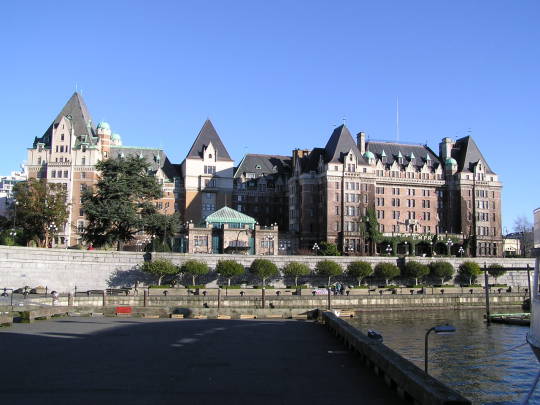
Vancouver Island Landmark – Empress Hotel in the Provincial Capital, Victoria, British Columbia, Canada
The Fairmont Empress (most commonly known as the Empress – named for Queen Victoria) is one of the oldest and most famous hotels in Victoria B.C., Canada. Located on Government Street facing the inner Harbor, the Empress has become an iconic symbol for the city itself. It was designated a National Historic Site of Canada due to it’s national significance.
History of the Empress Hotel
The Edwardian, chapeau-style hotel was designed by Francis Rattenbury for the Canadian Pacific Hotels as a terminus hotel for Canadian Pacific’s steamship line, whose main terminal was just a block away. the hotel was to serve businesspeople and visitors to Victoria, but later as Canadian Pacific ceased its passenger service to the city, the hotel was successfully remarketed as a resort to tourists. Victoria emerged as a tourists destination beginning in the mid-late 1920’s
The hotel was built between 1904 and 1908, opening for service in that year. Additional wings were added between 1909 and 1914, and in 1928. During this time, the Empress (as it was known then) played hostess to kings, queens, movie stars and many famous people. Examples include things such as the following:
In 1919 Edward, Prince of Wales waltzed into the dawn in the Chrystal Ballroom. This was an event considered by Victorians to be of such importance that almost 50 years later, obituaries of elderly ladies would appear under headlines such as, ‘ Mrs. Thornley-Hall dies. Prince of Wales singled her out.’
In the 1930’s, Shirley Temple arrived accompanied by her parents amid rumors that she had fled from California because of kidnapping threats, a story borne from the presents of two hug bodyguards who took the room opposite hers and always kept their door open.
On May 30, 1939 King George VI and Queen Elizabeth attended a luncheon at the Empress as guests of the Provincial Government.
For many years the hotel did not have a sign above the front entrance. The strong emotions the hotel evoked in the Victorians and guests and protectors was exemplified in a statement made by an irate gentleman, as workers raised the sign above the front entrance: ‘Anyone who doesn’t know that this is the Empress shouldn’t be staying here.
In 1965, there was much debate on whether to tear down what was becoming a faded dowdy hotel, to make room for a more modern functional high-rise hotel. One local newspaper warned that ‘Without this splendid relic from the Edwardian era, literally tens of thousands of tourists will never return. This is the Mecca, this is the heart and soul of the city.’ A decision was announced on June 10,1966: The Empress would not be demolished. Instead she would embark on a $4 million campaign of renovation and refurbishment, playfully dibbed ‘Operation Teacup.’
In 1989, over $45 million was spent in additional restoration known as The Royal Restoration. All the guest rooms were renovated , and a health club, indoor swimming pool and guest reception were added. With an emphasis on craftsmanship, no attempt was made to give the hotel a new image. Instead the coal was made to restore The Empress to it’s original, pre-war elegance.
In 1999, Canadian Pacific spun off the Canadian Pacific Hotels, along with all it’s properties. the new company was renamed Fairmont Hotels and Resorts in an effort to reflect it’s growing global presence and ambitions. as such all the former CP Hotel properties were to be renamed and rebranded with the prefix ‘Fairmont’. This lead to a loud uproar and consternation by Victoria’s newspapers and it’s citizens, a decision they viewed as a sacrilege. Although the new name stuck, Fairmont made no changes to the hotel’s exterior signage, as a compromise to the local anxieties and respect it’s iconic heritage.
Fairmont later sold the hotel on October 2000 to the Legacy Hotels for a substantial dollar amount. However Fairmont has a long management agreement with Legacy Hotels and as of August 2005 still held 11.14% of ownership in the property.
On June 27, 2014, the Fairmont Empress was purchased by Nat and Flora Bosa, Management reports that careful planning is in process on a renovation estimated at $30 million. the new owners have referred to the hotel as a Mona Lisa.
Related interesting side note about this building and this community of Victoria, British Columbia, Canada: A community can be a powerful influence on how it is kept together as people get together and work for common goals and objectives. Much is achievable.
Information for this blog has been gleaned from multiple internet sources. The person blogging has been to Victoria and visited the Empress Hotel. Visit us today at: architectureviews.net -The best in architecture planning
#the most popular architecture design#real estate books for sale on line#the top architecture books#best books for sale on line
0 notes
Video
youtube
SACRILEGE B.C.-time to die
0 notes
